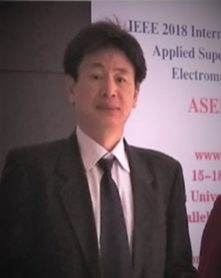Please note that the on-campus tutorial venue is Building 314, Room 317.
Tutorial 1: Fault Diagnosis in Modern Power Systems
By: Prof Fushuan Wen, IEEE Fellow
Speaker’s Bio: Professor Fushuan Wen received the BE and ME degrees from Tianjin University, Tianjin, China, in 1985 and 1988, respectively, and the PhD degree from Zhejiang University, Hangzhou, China, in 1991, all in electrical engineering. He joined the faculty of Zhejiang University in 1991, and has been a full professor and the director of the Institute of Power Economics and Information since 1997, and the director of Zhejiang University-Insigma Joint Research Center for Smart Grids since 2010. He has also been a full professor in the Hainan Institute, Zhjiang University, Sanya, China, since 2022.
He has been undertaking various teaching, research and visiting appointments in National University of Singapore (NSTB Postdoctoral Fellow, Research Fellow), Hong Kong Polytechnic University (Research Fellow, Visiting Assistant Professor), University of Hong Kong (Research Assistant Professor), South China University of Technology (University Distinguished Professor), University of New South Wales in Australia (ARC Project Senior Fellow, Senior Visiting Fellow), Queensland University of Technology in Australia (CSIRO and ARC Project Visiting Fellow), Brunei University of Technology (Professor in Power Systems), Technical University of Denmark (Otto Monsted Guest Professor in Power Systems), Nanyang Technological University in Singapore (Visiting Fellow), Murdoch University in Australia (Adjunct Professor), Tallinn University of Technology (Professor in Energy Systems), Hangzhou Dianzi University in China (Distinguished Professor), Commonwealth Scientific and Industrial Research Organization (CSIRO) in Australia (Honorary Visiting Scientist), Shenzhen Institute of Artificial Intelligence and Robotics for Society (Visiting Principal Research Scientist).
His research interests include: 1) power economics and electricity markets; 2) power system investment, planning and operation optimization; 3) smart grids and electric vehicles; 4) power system alarm processing, fault diagnosis and system restoration; 5) artificial intelligence applications in power and integrated energy systems. He has published 200+ SCI-indexed papers, 670+ EI-indexed papers, and 770+ Scopus-indexed papers. His publications have been cited for 17200+ times. He has completed and is undertaking more than 200 grants and projects from governmental organizations and industry.
Prof Wen received many awards both at the national level and provincial level, including the most prestigious National Natural Science Award of China. He has been listed in “Most Cited Chinese Researchers” in seven consecutive years since 2015 by Elsevier, and is the author of one of the China’s 100 Most Influential Domestic Academic Papers in 2016.
Prof Wen is the editor-in-chief of Energy Conversion and Economics (SPERI, IET, Wiley), the deputy editor-in-chief of Journal of Automation of Electric Power Systems, a subject editor in power system economics of IET Generation, Transmission and Distribution, associate editor of Journal of Energy Engineering and Journal of Modern Power Systems and Clean Energy. He is also on the editorial boards of more than 10 journals.
Prof Wen was elected to IEEE Fellow for contributions to fault diagnosis in power grids.
Tutorial 2: Energy Efficiency and Management with HTS Technology towards Forming HTS Smart Grids to Suit Sustainable Power and Energy Development
Abstract: In electric and green energy fields, high Tc superconductors (HTSs) provide opportunities for developing new concept power devices and energy systems. What is the latest in HTS characterization, pre-performance and current HTS development status? What is the advantage of HTS implementation? Can HTS devices be applicable practically? What is the future of HTS applications in power and renewable energy fields? While addressing those common curiosities, this tutorial will present principles and details from HTS material science to HTS devices and then HTS systems, covering the principles, device designs and practical applications. Advantages and benefits by using the HTS will be evaluated through the analysis both in principle and using results from practical experiments.
 Speaker Bio: Prof. Jian Xun Jin is currently a Professor with the School of Electrical and Information Engineering, Tianjin University, Tianjin, China. He is the Chair of the IEEE China Council Council of Superconductivity Chapter (CCCSC), Guest Editor-in-Chief of the IEEE Transactions on Applied Superconductivity special issues, and General Chair of the 2020 International Conference on Applied Superconductivity and Electromagnetic Devices (ASEMD). His current research interests include applied superconductivity, superconducting material characterization and application modelling, superconductors in strong current and electrical power applications, electromagnetic devices, electric machines, energy efficiency and green energy generation, electric vehicles, and control and measurement technologies. He has over 200 hundreds research papers published and also has 10 books and 10 book chapters, and 50 invention patents as the principal author and inventor in the above research fields.
Speaker Bio: Prof. Jian Xun Jin is currently a Professor with the School of Electrical and Information Engineering, Tianjin University, Tianjin, China. He is the Chair of the IEEE China Council Council of Superconductivity Chapter (CCCSC), Guest Editor-in-Chief of the IEEE Transactions on Applied Superconductivity special issues, and General Chair of the 2020 International Conference on Applied Superconductivity and Electromagnetic Devices (ASEMD). His current research interests include applied superconductivity, superconducting material characterization and application modelling, superconductors in strong current and electrical power applications, electromagnetic devices, electric machines, energy efficiency and green energy generation, electric vehicles, and control and measurement technologies. He has over 200 hundreds research papers published and also has 10 books and 10 book chapters, and 50 invention patents as the principal author and inventor in the above research fields.
Tutorial 3: Issues and Challenges of Large-Scale Renewable Energy Integration into the Grid
Abstract: This tutorial will discuss some of the technical challenges of integrating renewable energy into the grid. It will also discuss some potential technologies available in the market that can be used to minimise the challenges associated with the grid connection process.
 Speaker Bio: Dr. Md Moktadir Rahman is currently working as a Senior Power System Connection Planning Engineer at Essential Energy (in NSW, Australia), a Distribution Network System Operator (DNSP) where he is involved in the grid connection and planning of large-scale generators and loads. In his previous role as a Senior Power System Engineer at Ingeteam Australia Pty. Ltd, he was involved more than 3 GW of large-scale grid connected Solar PV and Battery integrations across Australia. Dr. Rahman has more than 8 years of experience in the power system planning, steady-state and dynamic studies, grid connected renewable energy integration and demand side management. He completed his PhD degree from Western Australia in 2018.
Speaker Bio: Dr. Md Moktadir Rahman is currently working as a Senior Power System Connection Planning Engineer at Essential Energy (in NSW, Australia), a Distribution Network System Operator (DNSP) where he is involved in the grid connection and planning of large-scale generators and loads. In his previous role as a Senior Power System Engineer at Ingeteam Australia Pty. Ltd, he was involved more than 3 GW of large-scale grid connected Solar PV and Battery integrations across Australia. Dr. Rahman has more than 8 years of experience in the power system planning, steady-state and dynamic studies, grid connected renewable energy integration and demand side management. He completed his PhD degree from Western Australia in 2018.
